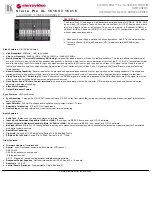
Smartports
Auto Smartport
Cisco Small Business 200 1.1 Series Smart Switch Administration Guide
110
9
Identifying Smartport Type
If Auto Smartport is globally enabled (in the
Properties
page) , and at an interface
(in the
Interface Settings
page), the switch applies a SmartPort macro to the
interface based on the Smartport type of the attaching device. Auto SmartPort
derives the SmartPort types of attaching devices based on the CDP and/or LLDP
the devices advertise.
If, for example, an IP phone is attached to a port, it transmits CDP or LLDP packets
that advertise its capabilities. After reception of these CDP and/or LLDP packets,
the switch derives the appropriate SmartPort type for phone and applies the
corresponding SmartPort macro to the interface where the IP phone attaches.
Unless Persistent Auto SmartPort is enabled on an interface, the SmartPort type
and resulting configuration applied by Auto SmartPort will be removed if the
attaching device(s) ages out, links down, reboots, or conflicting capabilities are
received. Aging out times are determined by the absence of CDP and/or LLDP
advertisements from the device for a specified time period.
Using CDP/LLDP Information to Identify Smartport Types
The switch detects the type of device attached to the port, based on the CDP/
LLDP capabilities .
This mapping is shown in
Table 2
and
Table 3
.
Table 2 CDP Capabilities Mapping to Smartport Type
Capability Name
CDP Bit
Smartport Type
Router
0x01
Router
TB Bridge
0x02
Wireless Access Point
SR Bridge
0x04
Ignore
Switch
0x08
Switch
Host
0x10
Host
IGMP conditional filtering
0x20
Ignore
Repeater
0x40
Ignore
VoIP Phone
0x80
ip_phone
Remotely-Managed Device
0x100
Ignore
CAST Phone Port
0x200
Ignore
















































